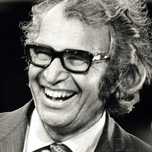 One of the towering figures in jazz, Dave Brubeck passed away on December 5, 2012, a day shy of 92. The maverick pianist, composer and bandleader was a major star for decades who kept writing new works and playing until the end. "Take Five," written by Paul Desmond and recorded by The Dave Brubeck Quartet, became the first million-selling jazz single and remains probably the single most recognizable jazz tune across the globe. Sometimes attacked for his success, Brubeck created his own sound and style; he never copied artists such as Duke Ellington and Louis Armstrong, whom he celebrated and revered.
One of the towering figures in jazz, Dave Brubeck passed away on December 5, 2012, a day shy of 92. The maverick pianist, composer and bandleader was a major star for decades who kept writing new works and playing until the end. "Take Five," written by Paul Desmond and recorded by The Dave Brubeck Quartet, became the first million-selling jazz single and remains probably the single most recognizable jazz tune across the globe. Sometimes attacked for his success, Brubeck created his own sound and style; he never copied artists such as Duke Ellington and Louis Armstrong, whom he celebrated and revered.Raised to be a rancher, Brubeck used to create songs in his head to the clip-clop of his horse's hooves. After serving in Europe during World War II, he returned to his native San Francisco Bay Area, where he studied classical music theory on the G.I. Bill with Darius Milhaud. The noted French composer and teacher encouraged Brubeck greatly, and he started playing an often experimental variation of swing and bebop with future stars such as Cal Tjader and Paul Desmond.
Partially paralyzed after a serious diving accident, Brubeck developed a hard-hitting, sometimes pounding piano style out of physical necessity and started working extensively with Desmond, a brilliant alto sax soloist. The two very different personalities (musical and otherwise) formed a lifelong friendship and a breathtaking improvisational bond where the pianist's often tough, daring ideas were countered by the saxophonist's swingingly romantic, airily melancholic sound. Each have fine albums under their own names but were never better than when they played together.
The Dave Brubeck Quartet, which finally settled on bassist Eugene Wright and drummer Joe Morello, put Fantasy Records on the map and became even more popular when they started touring universities as well as nightclubs, earning them the kind of hip audiences who listen to indie rock and electronic music today. The Quartet's unique sound and near telepathic interplay helped define West Coast cool jazz and made them critical darlings and fan favorites.
Miles Davis was recording Brubeck tunes over at Columbia Records and the pianist's star only grew larger at that label. He scored his greatest popular success with 1959's Time Out, which popularized odd musical time signatures that were studied by musicians at the time. Fronted by the hits "Time Out" and "Blue Rondo à la Turk," the album is second only to Miles' Kind of Blue as the best-selling acoustic jazz record of all time. Time Out is still a delight today: the fact that its songs now sound natural speaks to the wide impact Brubeck has had on jazz.
A fine, underrated songwriter, Brubeck kept experimenting with, and incorporating, ideas from World, classic and folk music into compositions and kept playing straight-ahead jazz for decades after his quartet with Desmond called it a day. He was also an early champion of civil rights, fought segregation and refused to tour South Africa in the 1950s—decades before most Americans had even heard the term "apartheid."
Many critics turned on Dave Brubeck after he achieved great commercial success. The irony being that he achieved popularity with a sound and style all his own (his record company originally didn't even want to release Take Five, which they considered too strange). Brubeck followed his own positive path his entire life and openly collaborated on projects with his wife and kids. While he took constant detours into extended composition, he always seemed to find almost as much delight in playing the piano as his fans did in listening to his music. – Nick Dedina, Google Play

0 comments:
Post a Comment